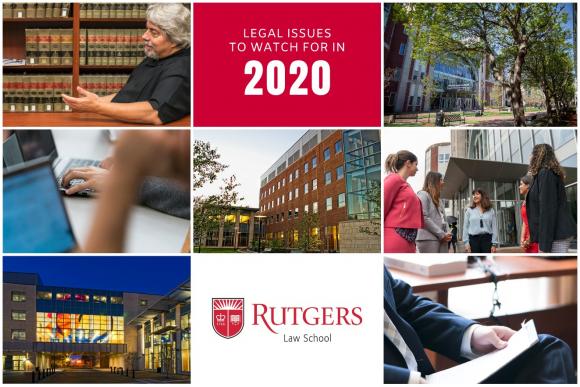
Rutgers Law professors are national experts in a number of fields and widely-published in those areas. Recently, they weighed in on some of the key legal issues that will be discussed and debated in the upcoming year. LGBTQ rights, voting issues, the availability of generic drugs, environmental concerns, healthcare, immigration, and human trafficking, and others, are legal developments to watch for in 2020.
Michael Carrier
Distinguished Professor of Law
With all the dysfunction in DC these days, can politicians agree on anything? Believe it or not, they can. At the end of 2019, Congress passed a law requiring brand drug firms to provide samples so generics could enter the market. This is a start, but there’s more work to do. At a minimum, in 2020 the legislature should address the other games drug companies play to keep generics off the market: settlements in which generics are paid not to enter, frivolous petitions filed with the FDA, and “product hopping” from one version of a drug to a trivially different one. In 2020, Congress can show that Republicans and Democrats can work together to bring relief to U.S. consumers paying too much for prescription drugs.

Sarah Dadush
Professor of Law
Today, society expects (much) more of corporations than simply maximizing financial returns. Governments around the globe are introducing new legislation to force companies to carry out due diligence to better understand the environmental, human rights, and social impacts of their supply chains and to report their findings publicly. On the private side, we are seeing an ever greater emphasis on the question, does this business's values align with my own values as a consumer, employee, or investor? This year we should pay close attention to how these rapidly evolving expectations are actually translating into better corporate behavior toward people and planet. In my own work, I'll be looking at how we can (and cannot yet) hold corporations accountable for the beyond-financial, ethical, or values-based promises they make to their stakeholders. The Volkswagen emissions scandal of 2015 was hugely significant in terms casting light on the importance of non-financial promises, but we are far from where we need to be with respect to having an effective accountability framework for companies that make and then break ethical promises.

Katie Eyer
Professor of Law
This year the Supreme Court will resolve a major longstanding issue for LGBTQ equality: whether anti-LGBTQ employment discrimination is prohibited by federal law. Last year, the Court granted certiorari review, and heard oral argument, in three cases presenting this question: Altitude Express v. Zarda, Bostock v. Clayton County and R.G. & G.R. Harris Funeral Homes v. EEOC. Collectively, these cases ask the question of whether anti-LGBTQ discrimination is necessarily “because of…sex” and thus prohibited by Title VII of the Civil Rights Act of 1964. Because there is no separate statute at the federal level that independently prohibits sexual orientation and gender identity discrimination, the way the Court resolves this issue will profoundly affect the protections available to LGBTQ Americans.

David Frankford
Professor of Law
Health care continues to be one of, if not the, leading issue facing our nation, and the partisan warfare that greatly intensified in 2009 during consideration of the Affordable Care Act (“ACA”) will continue in 2020. This war is being fought on numerous fronts, with constant battles over many issues pertaining to the ACA, Medicaid, surprise medical billing, drug pricing and prices overall, and more generally in the looming elections. Every branch of government is involved. The Trump administration has used almost every conceivable means to weaken the ACA and Medicaid, while giving lip service to ending horrors like surprise billing and astronomical prices. Of course, almost every administrative action then brings numerous court challenges and the courts have declared many measures, particularly with regard to Medicaid—such as imposition of a work requirement—to be unlawful. Congressional action is stymied with divided control.
Steve Gold
Professor of Law
One trend to watch for is the continuing increase in the use of genetics and genomics in the courtroom. Toxic tort cases are one example. In ongoing litigation over claims of cancer caused by asbestos in talc and the herbicide Roundup, as well as in many other toxic tort claims, expect to see defendants argue that a plaintiff’s genes, rather than a defendant’s product, caused the disease. How well will plaintiffs respond to these arguments? Will judges and juries conclude that genetics are a competing cause that result in illness independent of toxic exposure, or a concurring cause that combine with toxic exposures to increase the risk of illness?

Christina Ho
Professor of Law
The millions of Americans who have benefited from the Affordable Care Act will continue to face uncertainty in 2020 on whether its important protections will be pulled out from under them. It has been 10 years since what has become known as Obamacare passed into law, but the efforts to dismantle the bill have not let up. Even before the major provisions of the ACA took effect, opponents of the legislation sued alleging, among other things, that the individual mandate, that required Americans to purchase health coverage, was unconstitutional. The Supreme Court in 2012 rejected that argument in NFIB v. Sebelius. For the remainder of the Obama Administration, the House voted to repeal Obamacare over 50 times, even knowing it had no chance of passing with Obama in the White House. Once Trump was elected, they tried again, but in a dramatic middle-of-the-night vote, John McCain gave the decisive thumbs-down that finally killed off Republican prospects for repealing Obamacare wholesale through the legislature Congress. But Republicans have continued the project piecemeal and through other means. At the end of 2017, Trump rammed his Tax Cuts and Jobs Act through Congress, and in it, reduced the penalties for the individual mandate to zero. But Republican state officials have sued once again, arguing that somehow a de-fanged individual mandate is more unconstitutional than the original version that the Supreme Court upheld. A cherry-picked District Court judge agreed with them, and argued that the entire ACA had to fall along with the individual mandate. The Fifth Circuit indicated its agreement with the constitutional argument, but sent it back to the District Court to re-consider the severability of the rest of Obamacare. The fate of US health care will continue to hang in the balance.

Arthur Laby
Professor of Law
Last summer, the US Securities and Exchange Commission passed a series of new rules ramping up the duties imposed on stockbrokers and investment advisers. One example is Regulation Best Interest, which imposes a new “best interest” obligation on brokers. Most of the rules come into force in mid 2020, and the industry is gearing up to comply. The rules are very controversial and many investor advocates believe they do not go far enough. Moreover, there are court challenges to the rules and there is some chance they will be vacated, which means the SEC would have to start over. In addition to action on the federal level, the states have gotten involved as well. Several states, including New Jersey, have proposed rules to enhance the duties imposed on financial services providers that go beyond what is required on the federal level. Stay tuned for new state laws that try to get out in front of the SEC on these issues.

Randi Mandelbaum
Distinguished Clinical Professor of Law
The conditions of undocumented immigrant children detained by the federal government (specifically the Office of Refugee Resettlement, which is part of the Department of Health and Human Services), while the government attempts to deport them, have long been governed by a federal class action consent decree known as the Flores agreement. The federal government is now trying to undo the protections contained in Flores by enacting regulations. The protections that are part of the Flores agreement ensure that children's basic needs are met; that they are housed in facilities that are licensed for children; that they are released to family, if family is available; and that children are not detained in secure facilities unless they are a danger to themselves or others. Concerned about the welfare of thousands of vulnerable children, a federal district court in California enjoined these regulations from being implemented. However, the current administration appealed and the case is now before the 9th circuit on an expedited basis and may end up before the U.S. Supreme Court. The fate of these children who have already suffered severe trauma will be decided by this court case as well as who is in the new administration.

Eugene Mazo
Visiting Associate Professor of Law
The Supreme Court is about to hear a case that will determine the nuts and bolts of how we elect a President. The President is elected by the Electoral College, whose members are chosen by the states. Electors cast their votes in their respective states, and the first candidate to 270 wins the presidency. But could a state force an elector to cast his or her vote a certain way? Or are electors free vote with their conscience?
In 2016, a presidential elector from Colorado cast his electoral vote for John Kasich, despite the fact that Colorado law requires the state's electors to cast their votes for the winner of the state's popular vote, which went to Hillary Clinton. In response, Colorado's Secretary of State removed this "faithless" elector, discarded his vote, and replaced him with another elector who voted for Clinton. However, the U.S. Court of Appeals for the Tenth Circuit ruled that Colorado violated the U.S. Constitution by removing this "faithless" elector who voted his conscience. Meanwhile, the Washington Supreme State has taken a different view. After Hillary Clinton won in Washington, three "faithless" electors in the state cast votes for Colin Powell for president instead. These votes were transmitted to Congress and counted. The three faithless electors were then fined $1,000 under Washington state law, a fine upheld by the state's Supreme Court. Now the U.S. Supreme Court has agreed to resolve this issue. With the future of the presidency in the balance, this will certainly be a case to watch in 2020.

Penny Venetis
Clinical Professor of Law
On the international front, global challenges include climate change and violence (including domestic violence) and their impact on global displacement of people. As such, courts world-wide will continue to address issues related to the rights of immigrants. They will continue to evaluate whether asylum seekers can be detained as their cases are being processed, as well as the conditions of their detention. Other issues relate to human trafficking, and corporate involvement in facilitating trafficking. All eyes are on a US case that will determine whether international hotel chains can be held liable for human trafficking that takes place in hotels. Advocates around the world are also looking for solutions to inequality-based on income, gender and race.
Domestically, federal courts will make key determinations relating to issues that impact all of us. On the top of the list is protection of employees against abuses in the workplace. The U.S. Supreme Court will determine whether Title VII, enacted a half century ago to protect employees against race and sex discrimination, also protects members of the LGBTQ community from employment discrimination. The Supreme Court will also determine the future of abortion in our country. While the Court will be reviewing a Louisiana law requiring doctors who perform abortions to have hospital privileges, conservatives hope that the Supreme Court will use the case as an opportunity to re-examine and overturn Roe v. Wade. Indeed, in December 2019, approximately 200 members of Congress filed a brief with the Supreme Court asking it to do just that. This case is particularly significant because it makes no sense for the Supreme Court to have agreed to hear the case, as it struck down an almost identical Texas law a few years earlier, as burdening the right to choose.

Robert Williams
Distinguished Professor of Law
The United States Supreme Court now includes two of President Trump’s nominees, with the possibility of more. Many of his federal court nominees have been confirmed. As a consequence, many constitutional litigators seeking progressive decisions will likely turn their sights toward the state constitutions, as interpreted by state supreme courts. State constitutions contain all of the familiar rights guaranteed by the US Constitution, but also a number of less-well-recognized rights. State judicial decisions based on the state charters provide important victories, but only in a single state and are subject to possible reversal by state constitutional amendments. By contrast, constitutional litigators seeking conservative decisions (gun rights, abortion restrictions) will likely favor federal constitutional claims in federal court, with an eye toward national victories in the U.S. Supreme Court.

Norman Cantor
Professor of Law, Emeritus
Progressive dementia afflicts millions of people, ultimately entailing precipitous mental decline and years of complete dependence on others. Many people deem the prospect of serious cognitive dysfunction, helplessness, and dependence to be intolerably demeaning (as well as overly burdensome on others). To avoid being mired in dementia, they prefer to hasten death by advance instructions rejecting life-sustaining medical intervention. Some health care providers will resist implementation of such advance instructions, especially as applied to demented patients who are not ostensibly suffering in their demented states and no longer recall their instructions and the dignity concerns that underlay them. The clash between advance wishes to hasten death and health care providers' preference to maintain the well-being of non-suffering patients will be surfacing, in coming years, in institutional ethics committees, professional disciplinary forums, and the courts.